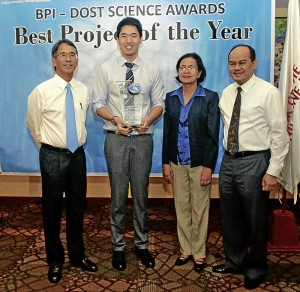UP stude paves way to adjust drug dose to patient needs

THIS YEAR’S BPI-DOST ‘Best Project of the Year’ Awards winner, University of the Philippines’ Sy (2nd from left) is flanked by proponents (from left) Aurelio Montinola III, president and chief executive officer of the Bank of the Philippine Islands; Dr. Filma Brawner, director of the DOST-Science Education Institute; and BPI Foundation executive director and BPI senior vice president Florendo Maranan. Arnold Almacen
Prescribe a high blood pressure medication to one patient and it will work fine. Try that same drug with the same dose to another person and it’s not enough, while few may even develop rashes or suffer from an upset stomach.
Indeed, when it comes to drugs, one dose does not fit all.
Fortunately, a senior Molecular Biology and Biotechnology student from the University of the Philippines has found a way to make dosing conform more precisely to patient’s profile.
Winner
For his research that began in November 2011, 21-year-old Jann Adriel Sy was declared winner of this year’s Bank of the Philippine Islands-Department of Science and Technology Science Awards besting five other college senior finalists and 24 other participants.
Sy received a total of P75,000 cash, trophy as well as a masteral or doctoral scholarship offer from DOST.
The key, according to Sy, is to look at the single nucleotide polymorphisms (SNPs) found in a person’s gene as these diminish the activity of a specific protein found in a person’s liver cells that plays a role in metabolizing drugs—the human pregnane X receptor (hPXR). The SNPs also reduce the activity of another drug-metabolizing enzyme called cytochrome P450 3A4 (CYP3A4).
“If doctors rely too much on manufacturer-recommended doses, they are in way, tailoring the patient to fit the drug rather than tailoring the drug to fit the patient. With my findings, doctors only need to use the so-called polymerase chain reaction (PCR) machine, which is readily available in most hospitals and clinics. High amounts of SNPs, would alert the doctor that the patient metabolizes the drug slowly and hence, may prescribe dosing that is more than what the manufacturer recommended,” said Sy who plans to take up medicine next year.
Metabolizer
If Sy’s research is soon incorporated into routine medical diagnostics, a doctor would now be able to rate each patient whether he or she is an ultra-rapid (hence, less dose of the medicine may be prescribed), extensive, intermediate or poor metabolizer of certain drugs.
This results in doctors prescribing a more tailored dosing of a particular drug.
Sy related that it would now be up to his project adviser, Dr. Reynaldo Garcia, to further refine his research for actual application or for patenting such medical diagnostic procedure.
Now on its 23rd year, the “Best Project of the Year Award” has produced over 600 awardees coming from its 10 partner universities namely: Ateneo de Davao University, Ateneo de Manila University, De La Salle University, Saint Louis University, Siliman University, University of San Carlos, University of the Philippines-Diliman, UP Los Baños, University of Santo Tomas and Xavier University-Cagayan de Oro.
This joint undertaking of the BPI Foundation and the DOST aims to recognize and provide incentives to graduating mathematics, physics, chemistry, engineering, computer science and biology students who would present exceptional if not breakthrough research or proposal.
Judges
The 2013 BPI-DOST Science Awards’ six finalists were screened by this year’s panel of judges composed of Joanna Gonzales-Syjuco, chief of DOST’s Computer Software Division; Dr. Carmel Gacho, specialist of Industrial Technology Development Institute’s Environment and Biotechnology Division; Dr. Claro Santiago Jr. assistant director of University of Perpetual Help Las Piñas’ Research and Development Center; engineer Darwin Rosales, chief of DOST’s Energy Utility and Systems Technology Development Division; and Ma. Corazon Guzman, SVP and head of operations of BPI’s Risk Management.
This year’s first runner-up is University of Santo Tomas’ Jose Paolo Aguilar whose project proposes for a more effective way of eliminating heavy metal contamination in water bodies located in industrial and manufacturing zones. Aguilar got a total of P55,000 cash prize and trophy.
The second runner-up award went to Ateneo de Manila University’s Napoleon Salvador Antonio whose project studied an alternative yet equally effective material in the manufacture of inexpensive solar panels. Salvador took home a total of P35,000 cash prize and trophy.
Each of the 27 students who qualified for this year’s contest got P25,000 cash prize and trophy.
